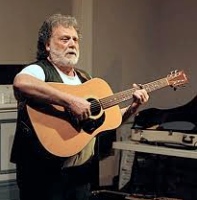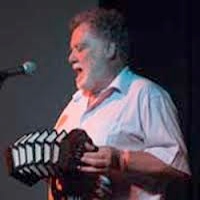- About Us
- Columns
- Letters
- Cartoons
- The Udder Limits
- Archives
- Ezy Reading Archive
- 2024 Cud Archives
- 2023 Cud Archives
- 2022 Cud Archives
- 2021 Cud Archives
- 2020 Cud Archives
- 2015-2019
- 2010-2014
- 2004-2009
 |
Danny Spooner and the Gorgeous, Game Girls |
Folk music festivals tend to be diverse gatherings. Attendees do not share a hard and fast definition of what constitutes folk music and so a variety of genres can be represented. People might be blues and roots fans, devotees of the spoken word, purists after accurate renditions of working class ballads, the curious wanting immersion in exotic cultures, followers of the latest products among songwriters, or instrumentalists seeking inspiration and involvement. Some crave participation and attend the ‘sessions’ or play for the many dancers who revel in the concentration of people with similar interests. There is little doubt however, that one strong element binds most folk festivals together – a core of traditional music performed in intimate acoustic settings.
In Australia there is no finer performer of traditional songs than Danny Spooner. In a career spanning half a century, Danny Spooner has participated at numerous festivals around the country and overseas, been honoured for his dedication and compiled a number of excellent recordings. His latest Gorgeous, Game Girls is an echo of the earlier Brave Bold Boys and maintains the high standards he has set himself over the years. Danny Spooner’s sleeve notes are always comprehensive as he gives a song’s provenance, acknowledges sources and explains idiosyncratic or anachronistic terms. On this album, Kerry Greenwood, author and creator of that renowned gorgeous, game girl The Hon. Phryne Fisher, supplies an introductory note. She pictures Spooner as a bard, a troubadour or a swashbuckling sea captain and says she is glad he jumped ship in Australia.
Danny Spooner was born in London’s multicultural East End. Singing by family members including an Irish grandmother, was an everyday occurrence. He says that while he might have learnt later that many of the songs were folk songs, to him they were just songs. Whether they were passed on from singer to singer in pubs, or came from the music halls or from radio, all were intrinsic elements of family gatherings. He remembers his Aunt Jess belting out many songs like ‘Artichokes and cauliflowers’ and describes her as ‘a darlin’ and right ‘ansom like this barra girl’. You can’t get much more working class than the cry of a street vendor. The odd rounded consonant shows that Danny Spooner would have fitted in nicely down at the Old Bull and Bush. The lilt he gives to two songs by Charles Thatcher, ‘Big Poll the grogseller’ and ‘Scrumptious young gals’, suggests that he would have been just as comfortable in the tent cities of Thatcher’s Victorian goldrush era.
Danny Spooner went to sea young, working first on the Thames and then on coastal shipping. Songs were a part of the rhythm of maritime life as well and Danny is among Australia’s most enthusiastic and authoritative singers of the sea shanty. He also picked up ballads sung by shipmates as vessels waited to enter ports with their cargoes. He is adept in several languages, probably because his singer’s ear enables him to quickly pick up the flavour in accents. This skill also means that he understands the innermost integrity of a song and knows whether particular variations in lyrics, melody or rhythms are legitimate.
He is adept in several languages, probably because his singer’s ear enables him to quickly pick up the flavour in accents. This skill also means that he understands the innermost integrity of a song and knows whether particular variations in lyrics, melody or rhythms are legitimate.
Greenwood recalls a time before feminist historians restored the gender balance in official histories. While the histories might have neglected women’s experiences, rendering women largely invisible, folk songs did not and so Danny Spooner was an indispensable source of the oral record of women’s achievements. The songs on Gorgeous, Game Girls describe characters who refused to be reduced to invisibility or passivity. A good example is the story of ‘Jackie Munro’. A rich farmer’s daughter, Munro fell in love with a poor ploughboy. Her father sent for the press gang to have the ploughboy removed and so Jackie Munro dressed as a man and enlisted in order to find her beloved. She served with distinction, was promoted, found and rescued her wounded lover and married him. This song collection celebrates women who seize the initiative, ensuring that men take seriously their responsibilities in relationships. ‘William Taylor’ is slain for being unfaithful. ‘The Copshawholme butcher’ who takes advantage of a chamber-maid has his baby plonked on his lap.
Perhaps the defining characteristic of Danny Spooner’s collection and performance of the songs of England, Scotland, Wales, Ireland, the ocean and Australia is the great respect with which he treats the material. While he might seem to have chosen certain songs for his various concerts and records, Danny argues that in fact the reverse is true and that the songs choose him. This he sees as a privilege – to be singled out as a vehicle for great songs looking for a contemporary voice. 
Well, it must be said that these songs have chosen wisely. At a Danny Spooner concert audience members hear and understand every word. Danny ensures that the song is in the foreground. Sometimes he accompanies a song with the concertina. Sometimes he uses the guitar. Sometimes he sings unaccompanied. He ensures that the musical backing does not overwhelm or detract from the song, and uses these instruments only to enhance the delivery of the song. He tells people at workshops that if they want to perform traditional songs, they really need to get their egos out of the way and to let the songs live.
Danny Spooner is known as a generous collaborator. On some of his CDs, other musicians supply instrumental accompaniment or great harmonies. The Gorgeous, Game Girls CD has 18 tracks but Danny provides all of the sound. Because of his impeccable timing, the rhythm and phrasing is perfect. As always, he has chosen an excellent song on which to end. ‘The Wallaby Track’ is mentioned in several Australian folk tunes, but in this particular one, a man who is a wanderer meets a pleasant young woman and sees the advantages of settling down. Danny Spooner leaves the listener happy and content.
Other tracks on the Gorgeous, Game Girls CD include: ‘The Spotted Cow’, ‘High Germanie’, ‘Creeping Jane’, ‘Cold and Raw’, ‘Claudy Banks’, ‘The Spinner’s Wedding’, ‘The Drunken Maidens’, ‘The Indian Lass’, ‘Sovay or The Female Highwayman’, ‘The Fair Maid of Islington’ and ‘The Lovely Joan’.
Tony Smith a former academic, has written on matters folk for the Australian Review of Public Affairs, the Journal of Australian Studies Review of Books and Overland.
